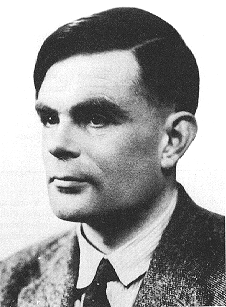|
|
Alan Turing was an English mathematician and a
founder of modern computer science. In 1936 Turing published a seminal paper,
"On Computable Numbers" , in which he conceived a remarkably simple,
but powerful abstract device for performing all possible computations.

The device, now called a Turing machine, consisted
of an infinite storage tape and read-write heads controlled by a finite
set of rules. Based on the current internal state of the control and the
value of the current tape cell, the Turing machine selects a rule that changes
the internal state, writes a value in the current tape cell, and moves the
read-write head left or right one tape cell.
After graduate studies at Princeton University
from 1936 to 1938, he worked in the British Foreign Office through World
War II, where he played a leading role in efforts to break enemy codes.
In 1945 he joined the National Physical Laboratory in London and worked
on the Automatic Computing Engine (ACE), where he developed an original
detailed design and prospectus for a computer in the modern sense, including
a then preposterous 4K bytes of storage space.
In 1948 he became deputy director of the Computing
Laboratory at Manchester, where the Manchester University Computer, the
first operational electronic programmable computer, was being built. He
also worked on theories of artificial intelligence and on the application
of mathematical theory to biological phenomenon. In 1952 he began publication
of his theoretical study of morphogenesis, the development of pattern and
form in living organisms.
Turing was arrested for violation of British homosexuality
statutes in 1952. He died of potassium cyanide poisoning two years later.
His work has been invaluable to the continuing development of complex systems
and computer science, as well as to modern research in articifial intelligence
and pattern formation in nature.
His legend even has been recognized in the arts
with the appearance of his Turing Machines in a recent popular work, "The
Diamond Age" by Neal Stephanson. And, if you are interested in Theatre
there is a play on Alan Turing called
"Breaking
the Code" by Hugh Whitemore
.
|
